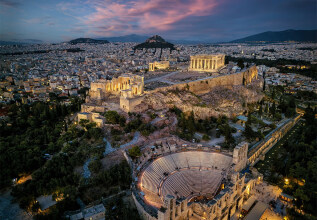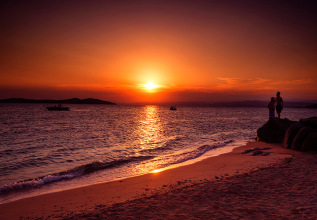5 MIN
TRAVEL TIPS
Autumn in Greece: 10 Amazing Getaways

 [/caption]
A discreet, low-profile destination, Kythnos possesses a unique style of its own. Its villages, including Mesaria, Dryopida and Merihas, differ greatly to standard Cycladic villages. Located three hours from Piraeus port, Kythnos makes for an ideal weekend getaway. Exceptional food choices are available on the island. Try the strapatsada (scrambled eggs in tomato sauce), tyropitaria (cheese pastry), dry olives and cheese croquettes. Consider visiting Kolona, an extremely impressive beach, where a strip of sand divides the sea into two.
4. Eastern Crete: get some sand between your toes
[caption id="attachment_7738" align="aligncenter" width="470" caption="It is worth reaching the northeastern tip of Crete for a plunge in the waters of Vai beach, famous for its palm forest."]
[/caption]
A discreet, low-profile destination, Kythnos possesses a unique style of its own. Its villages, including Mesaria, Dryopida and Merihas, differ greatly to standard Cycladic villages. Located three hours from Piraeus port, Kythnos makes for an ideal weekend getaway. Exceptional food choices are available on the island. Try the strapatsada (scrambled eggs in tomato sauce), tyropitaria (cheese pastry), dry olives and cheese croquettes. Consider visiting Kolona, an extremely impressive beach, where a strip of sand divides the sea into two.
4. Eastern Crete: get some sand between your toes
[caption id="attachment_7738" align="aligncenter" width="470" caption="It is worth reaching the northeastern tip of Crete for a plunge in the waters of Vai beach, famous for its palm forest."] [/caption]
With its southern coastline facing the Libyan Sea, Crete offers an appealing bonus compared to other islands – comfortable swimming beyond the summer season in October. Greece’s largest island possesses countless beautiful beaches. It’s worth heading to Crete’s northeastern edge for a swim at Vai beach, which is located next to a palm forest. For even more tropical conditions, make the small boat crossing from Ierapetra to Gaidouronisi, also known as Hrysi, to swim in the islet’s crystal-clear blue waters and sunbathe on its incredible, sand-covered beach in the north.
5. Arcadia: trekking in the heart of the Peloponnese
[caption id="attachment_7740" align="aligncenter" width="960" caption="Langadia village, the last stop on the Menalon Trail"]
[/caption]
With its southern coastline facing the Libyan Sea, Crete offers an appealing bonus compared to other islands – comfortable swimming beyond the summer season in October. Greece’s largest island possesses countless beautiful beaches. It’s worth heading to Crete’s northeastern edge for a swim at Vai beach, which is located next to a palm forest. For even more tropical conditions, make the small boat crossing from Ierapetra to Gaidouronisi, also known as Hrysi, to swim in the islet’s crystal-clear blue waters and sunbathe on its incredible, sand-covered beach in the north.
5. Arcadia: trekking in the heart of the Peloponnese
[caption id="attachment_7740" align="aligncenter" width="960" caption="Langadia village, the last stop on the Menalon Trail"] [/caption]
One of the most renowned areas in the Peloponnese, Arcadia, an area of authentic beauty, offers a trail linking historic local settlements that is truly worth exploring. The Menalon Trail, stretching 75km and formed back in antiquity, connects the villages of Stemnitsa, Dimitsana, Zygovisti, Elati, Vytina, Nymfasia, Magouliana, Valtetsiniko and Langadia.
6. Nemea: excursion to renowned vineyard landscapes
[caption id="attachment_7741" align="aligncenter" width="470" caption="Vineyards in Nemea, a region renowned for its wines"]
[/caption]
One of the most renowned areas in the Peloponnese, Arcadia, an area of authentic beauty, offers a trail linking historic local settlements that is truly worth exploring. The Menalon Trail, stretching 75km and formed back in antiquity, connects the villages of Stemnitsa, Dimitsana, Zygovisti, Elati, Vytina, Nymfasia, Magouliana, Valtetsiniko and Langadia.
6. Nemea: excursion to renowned vineyard landscapes
[caption id="attachment_7741" align="aligncenter" width="470" caption="Vineyards in Nemea, a region renowned for its wines"] [/caption]
A region well-known to Greek wine enthusiasts, Nemea is located in the northern Peloponnese. If you are interested in seeing the area’s vineyards and trying quality wines such as the celebrated red Agiorgitiko, local wineries, including Gaia Wines and Semeli Wines, offer tours and wine-tasting sessions.
7. Volos: ode to tsipouro
One of the first things visitors usually do when in Volos is to head to one of the city’s countless tsipouradika, for tsipouro (a pomace brandy) and assorted meze dishes such as olives, fried cheese (saganaki), meatballs, sardines, anchovies, red snapper, clams (gyalisteres) and many more exquisite selections. It really is worth sitting at one of these spots in the city center or in Neo Ionia, a district settled by Anatolian Greeks who ended up in Volos following the Asia Minor Catastrophe in 1922, prompted by an ill-fated Greek military campaign. The refugees brought with them the drink-and-meze ritual to their new home.
8. Ioannina: Discover the lake's island
[caption id="attachment_7742" align="aligncenter" width="960" caption="The castle of Ioannina reflected in the waters of Lake Pamvotida"]
[/caption]
A region well-known to Greek wine enthusiasts, Nemea is located in the northern Peloponnese. If you are interested in seeing the area’s vineyards and trying quality wines such as the celebrated red Agiorgitiko, local wineries, including Gaia Wines and Semeli Wines, offer tours and wine-tasting sessions.
7. Volos: ode to tsipouro
One of the first things visitors usually do when in Volos is to head to one of the city’s countless tsipouradika, for tsipouro (a pomace brandy) and assorted meze dishes such as olives, fried cheese (saganaki), meatballs, sardines, anchovies, red snapper, clams (gyalisteres) and many more exquisite selections. It really is worth sitting at one of these spots in the city center or in Neo Ionia, a district settled by Anatolian Greeks who ended up in Volos following the Asia Minor Catastrophe in 1922, prompted by an ill-fated Greek military campaign. The refugees brought with them the drink-and-meze ritual to their new home.
8. Ioannina: Discover the lake's island
[caption id="attachment_7742" align="aligncenter" width="960" caption="The castle of Ioannina reflected in the waters of Lake Pamvotida"] [/caption]
In Greece, the island-in-lake combination is rare, which is what makes Ioannina – featuring Lake Pamvotida, the largest lake in the entire Epirus region – different to other cities. The lake is home to an inhabited island, which may be reached by boat from the lake’s shore in ten minutes. The path around the island, small enough to go around on foot, leads you to marvelous views of the island’s greenery, restaurant choices along the way as well to a small museum dedicated to the island.
9. Nafplio: cannery turned into art
[caption id="attachment_7743" align="aligncenter" width="960" caption="The Fougaro, once a canning factory, now houses a library, art workshop, exhibition and concert areas, as well as a coffee shop."]
[/caption]
In Greece, the island-in-lake combination is rare, which is what makes Ioannina – featuring Lake Pamvotida, the largest lake in the entire Epirus region – different to other cities. The lake is home to an inhabited island, which may be reached by boat from the lake’s shore in ten minutes. The path around the island, small enough to go around on foot, leads you to marvelous views of the island’s greenery, restaurant choices along the way as well to a small museum dedicated to the island.
9. Nafplio: cannery turned into art
[caption id="attachment_7743" align="aligncenter" width="960" caption="The Fougaro, once a canning factory, now houses a library, art workshop, exhibition and concert areas, as well as a coffee shop."] [/caption]
Fougaro, an ultra-modern art complex that resulted from a lengthy restoration project of a historic canning facility, is located in Nafplio, a two hours’ drive from Athens. The complex hosts a library, an art shop selling ecofriendly clothes, as well as a café whose menu includes beverages made with Greek herbs. It also hosts a range of cultural events, including a jazz festival and sculpture exhibitions.
10. Mt Olympus: ascent to the Gods
Mt Olympus, at 2,918m Greece’s highest mountain, requires particular stamina and mountain-climbing experience to reach its peak, Mytikas. Of course, beginners and less advanced climbers, provided they are in good shape, can still enjoy the mountain’s slopes, where easier routes are available. Visitors can try to ascend from the Krevatia shelter to the Barbala peak (1,847m), one of 52 on the mountain. After a strenuous climb, trekkers usually head to one of the mountain shelters to regain strength: bean soup and sausages are typically on offer.
article by Greece Is
see original article here
[/caption]
Fougaro, an ultra-modern art complex that resulted from a lengthy restoration project of a historic canning facility, is located in Nafplio, a two hours’ drive from Athens. The complex hosts a library, an art shop selling ecofriendly clothes, as well as a café whose menu includes beverages made with Greek herbs. It also hosts a range of cultural events, including a jazz festival and sculpture exhibitions.
10. Mt Olympus: ascent to the Gods
Mt Olympus, at 2,918m Greece’s highest mountain, requires particular stamina and mountain-climbing experience to reach its peak, Mytikas. Of course, beginners and less advanced climbers, provided they are in good shape, can still enjoy the mountain’s slopes, where easier routes are available. Visitors can try to ascend from the Krevatia shelter to the Barbala peak (1,847m), one of 52 on the mountain. After a strenuous climb, trekkers usually head to one of the mountain shelters to regain strength: bean soup and sausages are typically on offer.
article by Greece Is
see original article here


